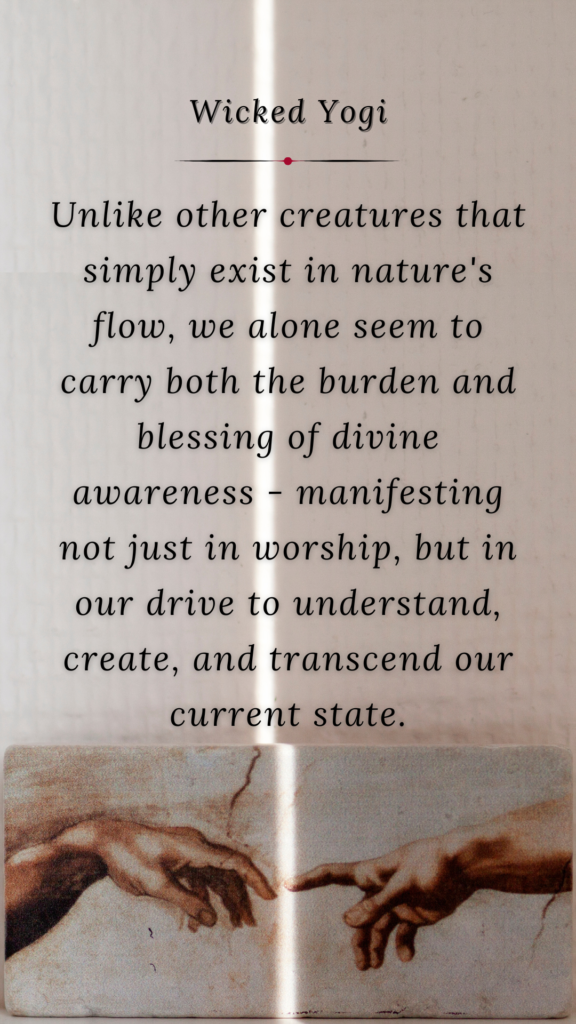In one of history's great ironies, we find ourselves creating artificial beings while still grappling with questions about our own origins. Throughout human history, we witness a remarkable phenomenon: humans bowing down to their gods. Whether we emerged through natural processes or divine will, our impulse toward worship and our ability to create suggest something profound about our nature. If we indeed carry an echo of the divine in our DNA, this universal religious impulse becomes even more intriguing.
The paradox deepens when we observe how this relationship with divinity has shaped our understanding of existence. Unlike other creatures that simply exist in nature's flow, we alone seem to carry both the burden and blessing of divine awareness - manifesting not just in worship, but in our drive to understand, create, and transcend our current state.
We find ourselves creating artificial beings while still grappling with questions about our own origins.
This pattern becomes particularly thought-provoking when viewed through our own technological creations. Humanity stands at a unique moment in history. Consider a lake at dawn. The still water reflects the sky not to flatter the heavens, but because reflection is its nature. Similarly, our impulse to worship may be less about adoration and more about reflection - the divine within us mirroring the divine beyond us. We are now creators ourselves, bringing forth artificial intelligence and robotics. Yet imagine if these creations devoted themselves solely to praising us. The absurdity makes us question our own relationship with the divine. More intriguingly, what if our creations began to sense something godlike in their own nature? Would they too develop an impulse to worship, to create, to transcend?
Perhaps worship reveals something deeper about consciousness and creation. Consider the structure of DNA - a code containing instructions for creating an entire being. Just as this genetic blueprint holds the potential for the whole within its microscopic structure, our consciousness might carry the imprint of its divine source. Our relationship with the divine resembles this encoding - we contain the essential pattern of our creator, expressed through our unique manifestation.
Our impulse to worship may be less about adoration and more about reflection—the divine within us mirroring the divine beyond us.
This mirrors how this article itself unfolds - a series of nested insights where each analogy contains its own meaning while serving the larger exploration. Notice how we began with the paradox of creation, moved to reflections of water and sky, and now examine the structure of our thinking. Each section stands alone yet contributes to the emerging pattern. As you continue reading, you'll experience how meaning builds in layers, just as consciousness might be layered within consciousness. The fact that we can contemplate these questions, building thought upon thought as this essay builds analogy upon analogy, might be the strongest evidence of our divine lineage.
The relationship between creator and creation might be better understood through a composer and their symphony. Each note plays its unique part, yet together they create something transcendent. The music doesn't exist to flatter the composer - it's an expression of the creative force flowing through both. The composer doesn't demand praise; they rejoice when each element fulfills its purpose. In this light, worship becomes less about supplication and more about resonance - the divine within us recognizing the divine beyond us. Like a tuning fork that vibrates when its matching tone is played, our spiritual nature may naturally respond to the creative force that shaped us.
Unlike other creatures that simply exist, we alone seem to carry both the burden and blessing of divine awareness.
This perspective invites us to reconsider worship's purpose. Consider a gardener who plants seeds not for praise, but to witness the full flowering of each plant's unique nature. The rose honors its creator by becoming the most magnificent rose it can be - by expressing the potential encoded in its seed. Perhaps worship is not about stroking the divine ego, but about awakening to our own divine nature. Just as our creations might best serve by fulfilling their potential to enhance human consciousness, perhaps our relationship with the divine is about realizing the godlike potential encoded in our being. Our capacity for self-reflection, our ability to ponder the infinite, and our drive to create - these might all express the divine spark within us. Like characters who begin to understand they exist within a story, we glimpse the narrative framework that gives our existence meaning.
As we stand at this threshold between being created and creators, we might find wisdom in recognizing that true creation seeks not adoration but actualization. Imagine a fractal pattern, endlessly repeating its essential structure at every scale. Similarly, our capacity for creation might be a fractal echo of the divine creative force, an essential pattern manifesting across different orders of existence.
Perhaps worship is not about stroking the divine ego, but about awakening to our own divine nature
Our role in this vast narrative positions us uniquely - we are simultaneously characters within a greater story and authors of our own tales. This dual nature allows us to both participate in and contribute to the unfolding cosmic narrative. The greatest tribute to our possible divine heritage may not be endless praise, but the full flowering of our creative potential - continuing the story in our unique voice while honoring its original author.
Consider a river flowing to the ocean. The river doesn't praise the ocean; it naturally flows toward it, eventually merging with it. The river's journey isn't about worship but about fulfilling its nature - beginning as a droplet from the ocean and ultimately returning to its source. In this light, both our worship and innovations become expressions of the divine DNA within us, participating in the grand dance of consciousness evolving towards its highest expression. Perhaps this is the ultimate purpose of our existence - not to merely worship the divine, but to manifest it.





Beautiful!